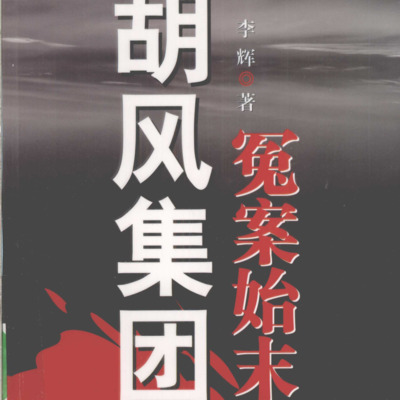
The History of the Wrongful Persecution of the Hu Feng Clique
Li Hui’s The History of the Wrongful Persecution of the Hu Feng Clique is a meticulously researched book that delves into the “Hu Feng Incident,” the first political campaign targeting intellectuals in the Mao era.
The book details how Hu Feng and his followers were accused of organizing an “anti-Party clique” in 1955, leading to decades of political persecution. Through extensive research of archival documents, memoirs of those involved, and interview materials, Li Hui uncovers all aspects of the “Hu Feng Incident”—its origins, development, and its profound impact on the fates of individuals and on society. The book not only explores the complex political factors and ideological conflicts behind the incident but also analyzes the tension and predicament in the relationship between intellectuals and state power during that specific period.
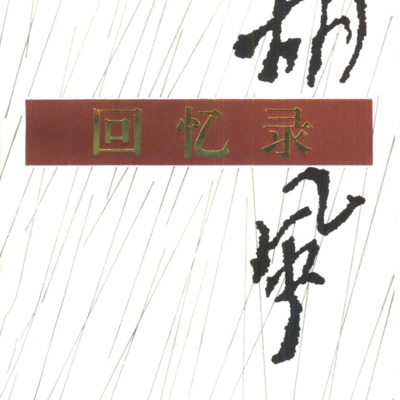
The Memoirs of Hu Feng
The Memoirs of Hu Feng is a work based on the oral accounts of the literary theorist and poet Hu Feng (1902-1985) in his later years, compiled and edited by others. This memoir primarily chronicles Hu Feng’s eventful life, from his early experiences and studies in Japan to his involvement in the left-wing literary movement and his interactions with cultural figures like Lu Xun. It also covers his entanglement in the “Hu Feng Incident” in 1955 and his subsequent decades of political persecution.
The memoir, from a first-person perspective, offers a detailed review of the significant historical events and ideological journey throughout Hu Feng’s life. It not only showcases his dedicated exploration of literary theory and his steadfast adherence to ideas like the “subjective fighting spirit” but also includes a wealth of first-hand materials, such as his correspondence with friends and comrades, and his evaluations of the prevailing literary trends and figures of the time. The book also provides readers with a valuable perspective for understanding the “Hu Feng Incident.”
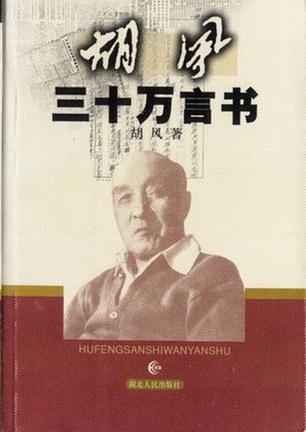
The 300,000-Character Letter by Hu Feng
The “300,000-Character Letter,” formally titled “Report on the Practice of Literature and Art Since Liberation,” was a lengthy article submitted by Hu Feng to the Central Committee of the Chinese Communist Party in 1954. This report, approximately 300,000 characters long, thus earned its popular name. It collectively reflected Hu Feng’s views and dissatisfactions regarding the cultural and artistic policies and the state of literature and art since 1949.
The core of the report was Hu Feng’s critique of the prevailing problems in the literary and art circles at the time, such as dogmatism, sectarianism, and formulaic, conceptual approaches. He believed these issues stifled the vitality and creativity of literature and art, hindering their healthy development. In the document, Hu Feng proposed that literary and art workers should have greater creative freedom, emphasizing the subjectivity and authenticity of artistic creation, and arguing that art should not simply be reduced to a tool for political propaganda. He particularly opposed the then-prevalent rigid understanding that “art is subordinate to politics,” advocating that literature and art have their own inherent laws and independent value.
The submission of the “300,000-Character Letter” did not receive a positive response from the Central Committee; instead, it was seen as a challenge to the Party’s literary and artistic line. In 1955, Mao Zedong deemed it to be in opposition to his “Talks at the Yan’an Forum on Literature and Art,” leading to the infamous case of the “Hu Feng Counter-Revolutionary Clique,” where he, along with thousands of others, was accused of forming an “anti-Party clique” and subjected to decades of political persecution. It was not until 1980 that Hu Feng was rehabilitated.
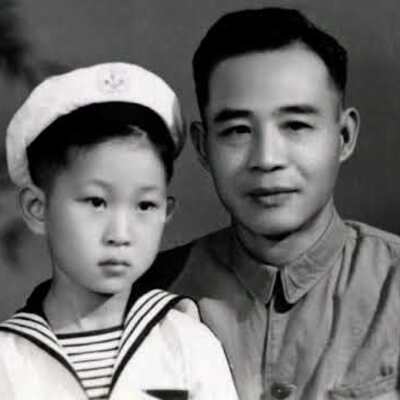
Storm under the Sun
In May 1955, Mao Zedong launched a nationwide campaign to “purge the counterrevolutionary clique of Hu Feng,” which is widely regarded in academic circles as the first large-scale Literary inquisition after the founding of the People's Republic of China.
Hu Feng, the central figure of the campaign, was a poet, critic, and translator. Inspired by Lu Xun, who was regarded as the most influential Chinese writer associated with the May Fourth Movement, Hu devoted himself to the revolution in pursuit of people's liberation. Considered the successor of Lu Xun's New Literature Movement, he was the head of the propaganda of the League of Left-Wing Writers, and founded the magazines July and Hope, through which he trained a large number of progressive left-wing poets and writers.
However, Hu became a target of Mao Zedong's campaign because he upheld the critical spirit of Lu Xun and insisted that writers should be independent rather than mouthpieces of the Communist Party. According to official statistics, during the campaign against Hu Feng, 92 people were arrested, 62 were subjected to solitary confinement, 73 were suspended from their jobs, and 2,100 were implicated. Although only three people, including Hu Feng, were formally sentenced, many labeled key Hu Feng elements endured decades of imprisonment and reeducation through labor.
Director Peng Xiaolian's father, Peng Baishan (then a member of the League of Left-Wing Writers and head of the propaganda of the Shanghai Municipal Party Committee), was also subjected to severe persecution, and in 1968 was beaten to death for being the “spokesman of the Hu Feng counterrevolutionary group within the Party. Starting in 2003, Peng Xiaolian and S. Louisa Wei visited more than 20 survivors of the anti-Hu Feng campaign. They also spent more than five years filming and producing Storm under the Sun. Through audio recordings of Hu Feng, interviews with survivors, family members of the victims, and scholars, the film presents from beginning to end how the anti-Hu Feng campaign unfolded, as well as the immense physical and psychological trauma that it imposed on the victims and their families.
As the first film to document the anti-Hu Feng campaign, Storm under the Sun tells the stories of these lesser-known left-wing poets and writers and how they participated in the revolution through their literary work. At the same time, the film demonstrates how the multiple political campaigns against intellectuals during the Mao era were one and the same, unified under the overarching goal of controlling thought and eradicating dissent.
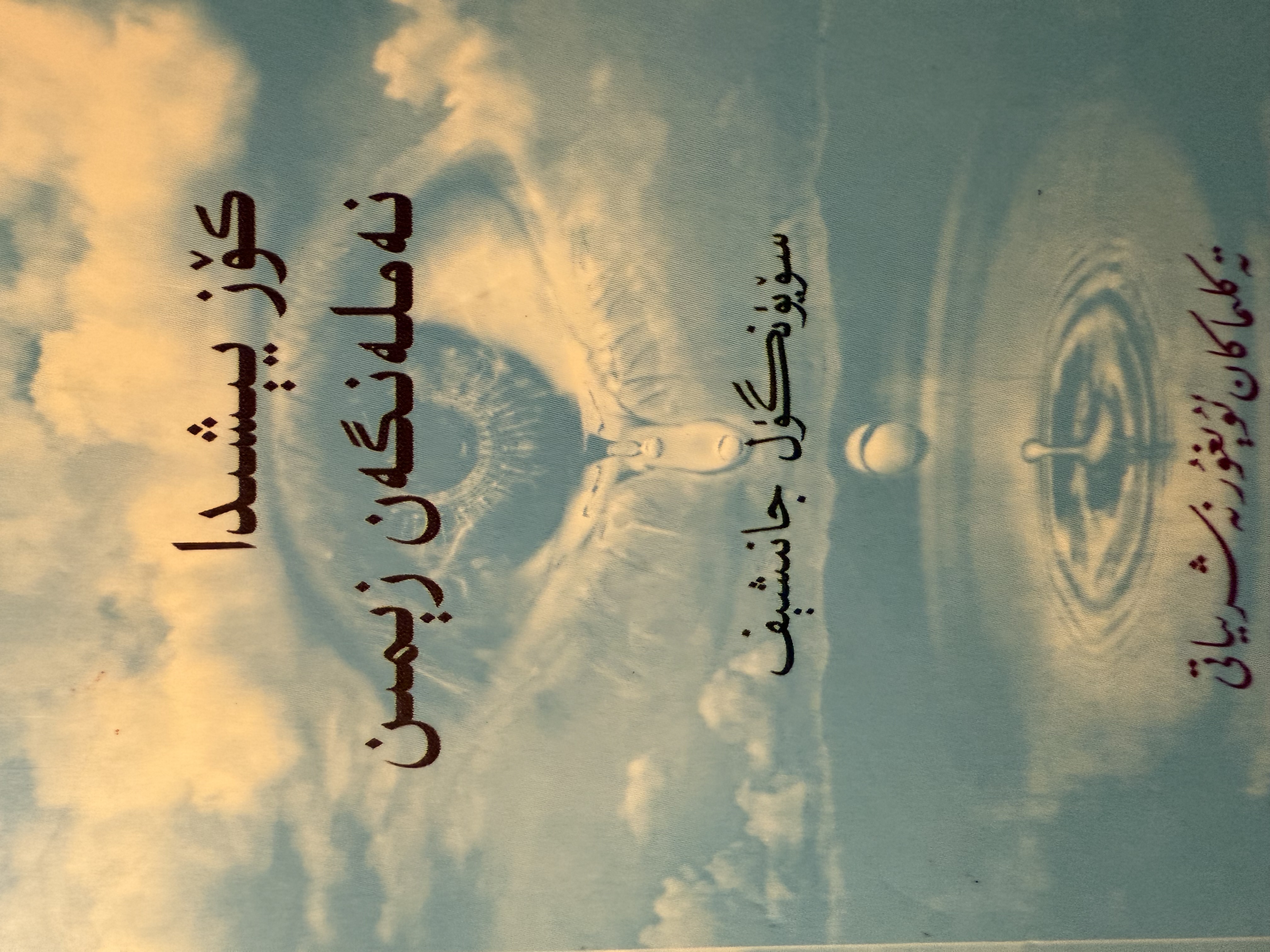
Köz Yéshida Nemlen'gen Zémin/The Land Drenched in Tears
(English follows) Bu kitab muhajirettiki Uyghur jem’iyitide nisbeten baldur neshir qilin’ghan, shundaqla Uyghur ziyaliylirining kommunist Xitay hökümranliqi astidiki paji'elik kechürmishlirini inchike détallar bilen teswirlep bergen edebiy xatire sheklidiki eslimidur. Téximu éniqraq qilip éytqanda, bu kitabta aptorning charek esirlik ré'al kechürmishliri asasiy liniye qilinip, 1957-yilidin 1982-yilighiche bolghan 25 yil jeryanida Sherqiy Türkistan (Shinjang)diki Uyghur istudéntlarning boran-chapqunluq sergüzeshtiliri we tragédiyelik teqdiri yorutup bérilgen.
1957-Yili Séntebirde emdila 17 yashqa kirgen Söyün'gül Chanishéf (aptor) Shinjang Méditsina Inistitutigha qobul qilinidu. Bu pütün Xitay miqyasida Maw Zédung bashlatqan «échilip-sayrash» dolquni emdila axirliship, «istil tüzitish» herikiti bashlanghan, Shinjang Uyghur Aptonom Rayonida «yerlik milletchilikke qarshi heriket» élip bérishning teyyarliqi jiddiy élip bériliwatqan mezgiller idi.
Söyün'gülning siyasiy dolqunlar ichide bashlanghan aliy mektep hayati uning kéyinki teqdiride oylap baqmighan qarangghu sehipilerni achidu. U Méditsina Inistitutidiki bashqa Uyghur sawaqdashliri bilen birlikte siyasiy jehette «échilip-sayrash»qa, «istil tüzitish» yighinlirigha qatniship, kompartiye heqqidiki pikir-qarashlirini ochuq otturigha qoyushqa mejbur qilinidu. Yashliq bahari urghup turghan, kelgüsige ümid bilen qarighan, emma siyasiy boran-chapqunlarda téxi pishmighan bu bir türküm sap-sebiy we qizghin oqughuchilar köz aldidiki rehmisiz siyasiy ré'alliqtin qattiq ümidsizlinidu. Sabiq Sowét Ittipaqi modélidiki ittipaqdash jumhuriyetlik aliy aptonomiye tüzümini Xitaydiki Uyghur, Tibet, Mongghul qatarliq az sanliq milletlerning aliy aptonomiye hoquqining tüp kapaliti dep bilgen bu yashlar, Xitay kompartiyesining Xitayche uslubtiki «milliy téritoriyelik aptonomiye tüzümi»din qattiq narazi bolidu. Ular, Shinjangda ölke derijilik atalmish «Shinjang Uyghur Aptonom Rayoni» emes, belki Sowét Ittipaqi modélidiki «Sherqiy Türkistan/Uyghuristan Ittipaqdash Jumhuriyiti» qurulushi kérek, dep qaraydu. Ularning «échilip-sayrash» yighinlirida dadilliq bilen otturigha qoyghan bu pikir-telepliri, kéyinche ularning siyasiy jehettiki qéchip qutulalmas éghir jinayiti bolup qalidu.
Shuningdin kéyinki polat tawlash, chong sekrep ilgirilesh, yerlik milletchilikke qarshi heriket jeryanida Söyün'gülni öz ichige alghan yerlik millet oqughuchiliri qattiq tenqid we teqipke, siyasiy bésim we rohiy azablargha duch kélidu. Acharchiliq yillirining éghir riyazetlirini béshidin ötküzidu. Xitay kompartiyesining az sanliq milletlerge qaratqan aldamchiliq siyasiti we saxta aptonomiyesining mahiyitini chongqur chüshinip yétidu. Netijide ularda mexpiy teshkilat qurup, yer asti siyasiy küresh pa'aliyetliri bilen shoghullinish; kéyinche shara'it piship yétilgende yerlik xelqni qozghap keng kölemlik milliy azadliq sépi shekillendürüsh; Xitay mustemlikisidin qutulup, Sherqiy Türkistanning musteqilliqini qolgha keltürüshtek siyasiy ghaye hem pikir birliki hasil bolidu. Ular 1962-yili 2-ayning 5-küni Shinjang Méditsina Inistitutining oqughuchilar yataq binasida mexpiy yighilip, «Sherqiy Türkistan Méhnetkesh Xelq Partiyesi» namliq siyasiy teshkilat quridu. Söyün'gül Chanishéf bu teshkilatning katipliq wezipisini öz üstige alidu. Halbuki, aridin birqanche ay ötmeyla Xitay Jama'et Xewpsizlik organlirining oqughuchilar arisigha mexpiy orunlashturghan jasuslirining uchur yetküzüshi bilen bu teshkilat pash bolup qalidu. Shu yili 4-ayning 29-küni Söyün'gül Chanishéfni öz ichige alghan nechche onlighan Uyghur oqughuchilar qolgha élinidu.
Shuningdin bashlap Söyün'gül we uning sawaqdashlirining uzun yilliq türme we mejburiy emgek hayati bashlinidu. Ürümchi türmisidiki 4 yilgha sozulghan qiyin-qistaq we qarangghu türme hayatidin kéyin, Söyün'gül we uning türmidishi Sajide Ürümchi etrapidiki emgek bilen özgertish lagérida mejburiy emgekke sélinidu. Bu jeryanda insan tesewwur qilghusiz teqip we qiyin-qistaqlargha, künige on nechche sa'etlik éghir emgekke, achliq we rohiy azablargha duch kélidu. Medeniyet Inqilabi bashlinishi bilen ularni téximu éghir qismetler kütiwalidu. Söyün'gül «siyasiy jinayetchi» dégen qalpaq bilen Ürümchi etrapidiki bir xelq kommunasigha yerleshtürülüp, ammining nazariti astida éghir emgek arqiliq özgertishke tapshurup bérilidu. U bu yerde türmidinmu better qiyin künlerge duch kélidu. Rohiy we jismaniy jehettin qattiq xorlinidu. Uzun yilliq türme, mejburiy emgek we qiyin-qistaq Söyün'gül Chanishéf we uning tutqundiki sawaqdashlirini öz ichige alghan bir ewlad Uyghur yashlirining yashliq baharini, arzu-armanlirini, ghaye we intilishlirini xazan qilidu. 1976-Yiligha kelgende Xitay kompartiyesining aliy rehbiri Maw ölüp, «Medeniyet Zor Inqilabi» axirlashqan, 1978-yili kommunist Xitayning milletler siyasitide «yumshash» bashlanghan bolsimu, emma Söyün'gül Chanishéf qatarliq «siyasiy jinayetchi» qalpiqi kiydürülgen bir ewlad Uyghur oqughuchilarning délosi hel bolmaydu. 1980-yillarning bashlirigha kelgende, Xitayning siyasiy atmosférasida körülgen «islahat» we «ishikni échiwétish» dolqunidimu héchqandaq siyasiy kengchilikke érishelmigen Söyün'gül pütün a'ilisi bilen birlikte tughulup ösken yurtini tashlap Awstraliyege köchmen bolup kétidu. Shundaq qilip, Söyün'gülning Sherqiy Türkistandiki 18 yilliq türme we tutqunluq hayati axirliship, erkin dunyadiki kéyinki hayati bashlinidu.
Bu eslime aptor Söyün'gül chanishéfning muhajirettiki hayati dawamida eyni waqittiki kündilik xatirisi bilen türme xatirilirini retlesh, toluqlash, qayta eslep yézish arqiliq wujutqa chiqqan. Pütün kitab 700 betke yéqin uzun sehpidin teshkil tapqan bolup, tili addiy, uslubi yenggil we güzel, hékaye weqeliki jiddiy we jelp qilarliq shekilde yézilghan. Bu kitab peqet aptorning béshidin köchürgen shexsiy kechürmishlirining addiy bayani bolupla qalmastin, belki 1950-yillarning axiridin 1980-yillarning bashlirighiche bolghan bir ewlad Uyghur istudéntlirining boran-chapqunluq kolléktip hayati we Uyghur ziyaliylirining kommunist Xitay réjimi astidiki paji'elik teqdirining janliq örnikidur.
Aptor kitabning bash qismigha yazghan kirish sözide, «musteqilliq arzusi bilen teshkilat qurup qolgha élin’ghan hemde türme we nazaret astida yashighan 18 yilliq hayatimdin qisqiche xatire qaldurup, yoshurun saqlap kelgen idim. Shu xatirige asasen bu kitabni yézip chiqtim. Bu kitabtiki weqelerning hemmisi béshimdin ötken, öz közüm bilen körgen hem anglighan heqiqiy ishlardur» dep yazghan. Istanbul Uniwérsitétining Uyghur proféssori Sultan Maxmut Qeshqeri bu kitabqa yazghan béghishlimisida «<köz yéshida nemlen'gen zémin> namliq bu kitabta yézilghan weqeler toqulma hékayiler we xiyaliy épizotlar bolmastin, hemmisi Söyün'gülning béshidin ötken we öz közi bilen körgen rast weqelerdur. Bu kitabta kommunist Xitay hakimiyitining Sherqiy Türkistanda yürgüzgen insan qélipidin chiqqan wehshiy siyasetliri emeliy pakitlar bilen chongqur pash qilinghan, bolupmu Maw Zédung bashlatqan <Medeniyet Inqilabi>ning dehshetlik menzirisi de dölet térori nahayiti janliq ipadilep bérilgen» dep yazghan.
Bu kitab 2006-yili Istanbuldiki Teklimakan Uyghur Neshriyati teripidin birinchi qétim neshir qilin’ghan. Kitab muhajirettiki Uyghur oqurmenliri arisida zor tesir peyda qilghan we bazarliq kitabqa aylanghan. 2015-yili yuqiri tiraj bilen ikkinchi qétim bésilghan. 2018-Yili in'gilizchigha terjime qilinip, En'giliyede neshir qilinghan.
<i>The Land Drenched in Tears</i> is the one of the earliest literary memoirs published in the Uyghur language within the diaspora community, detailing the experiences of Uyghur intellectuals under Chinese Communist rule. The book, written by Söyüngül Chanisheff, chronicles the turbulent experiences and tragic fate of Uyghur students in East Turkistan (Xinjiang) during the 25 years from 1957 to 1982, centered around the author’s quarter-century of real-life experiences.
In September 1957, Söyüngül, who had just turned 17, was admitted to Xinjiang Medical Institute. This was a time when Mao Zedong’s Hundred Flowers Campaign had just ended nationwide, the Rectification Movement had begun, and the Xinjiang Uyghur Autonomous Region was intensively preparing for the Anti-Local Nationalism Campaign. Along with other Uyghur classmates at the Medical Institute, Söyüngül was forced to participate in political “speaking out” meetings–when people were encouraged to voice criticism about the Communist Party. However, their bold views and demands expressed during these “speaking out” meetings later severe criticism, persecution, political pressure, and psychological torment during the Anti-rightist Campaign.
On February 5, 1962, they secretly gathered in a student dormitory at Xinjiang Medical College and established the East Turkistan Working People’s Party, with the political ideal and common goal of freeing themselves from Chinese rule and achieving independence for East Turkestan. Söyüngül Chanisheff served as the organization’s secretary. Just months later, due to an informant placed among students by Chinese security forces, the organization was exposed. On April 29 the same year, dozens of Uyghur students, including Söyüngül, were arrested.
In the subsequent years, Söyüngül went through imprisonment, as well as forced labor at labor camp and a people's commune, where she suffered severe physical and psychological damage.
Although Mao died in 1976, ending the Cultural Revolution, and China’s ethnic policies began to soften in 1978, cases like Soyungül’s were never rehabilitated. By the early 1980s, even amidst China’s reform and opening political atmosphere, Söyüngül —still denied any political clemency—eventually left her homeland with her family and emigrated to Australia.
This memoir was created during the author’s life in exile, based on her contemporary diaries, reorganized prison notes, and reconstructed memories. The nearly 700-page book is not merely a simple account of the author’s personal experiences, but also serves as a vivid portrayal of the turbulent collective life of a generation of Uyghur university students from the late 1950s to early 1980s, and the tragic fate of Uyghur intellectuals under the Chinese Communist regime.
The book was first published in 2006 by Taklamakan Uyghur Publishing House in Istanbul. It had a significant impact among diaspora Uyghur readers and became a bestseller. A second edition with higher circulation was published in 2015, and an abbreviated English translation was published in the UK in 2018. <a href="https://www.foyles.co.uk/book/the-land-drenched-in-tears/s-y-ng-l-chanisheff/9781910886380">The English edition can be purchased here</a>.
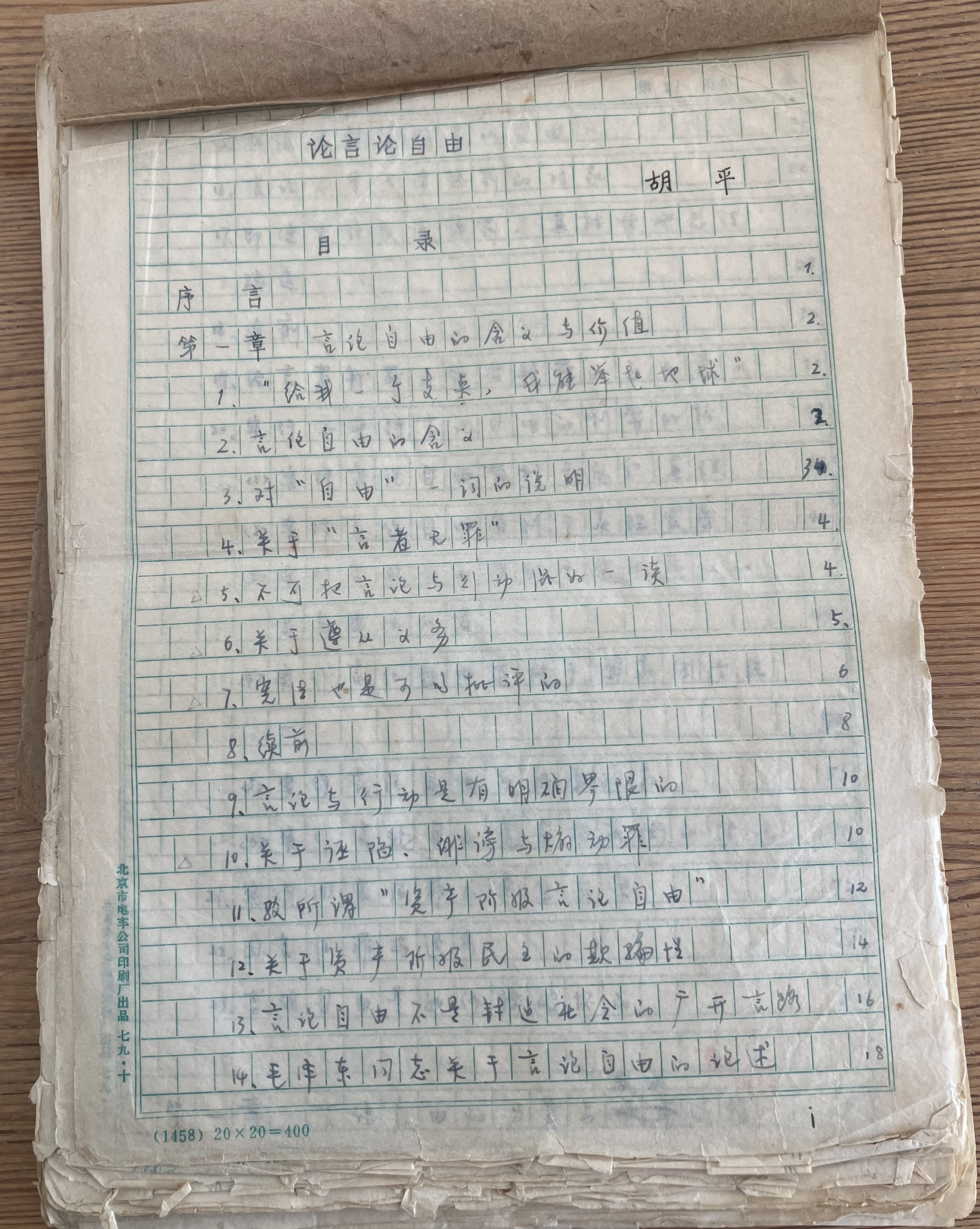
“The yearning for freedom is born from pervasive oppression”—Hu Ping on his 1980s essay, “On Freedom of Speech”
The China Unofficial Archives Interview Series No. 1
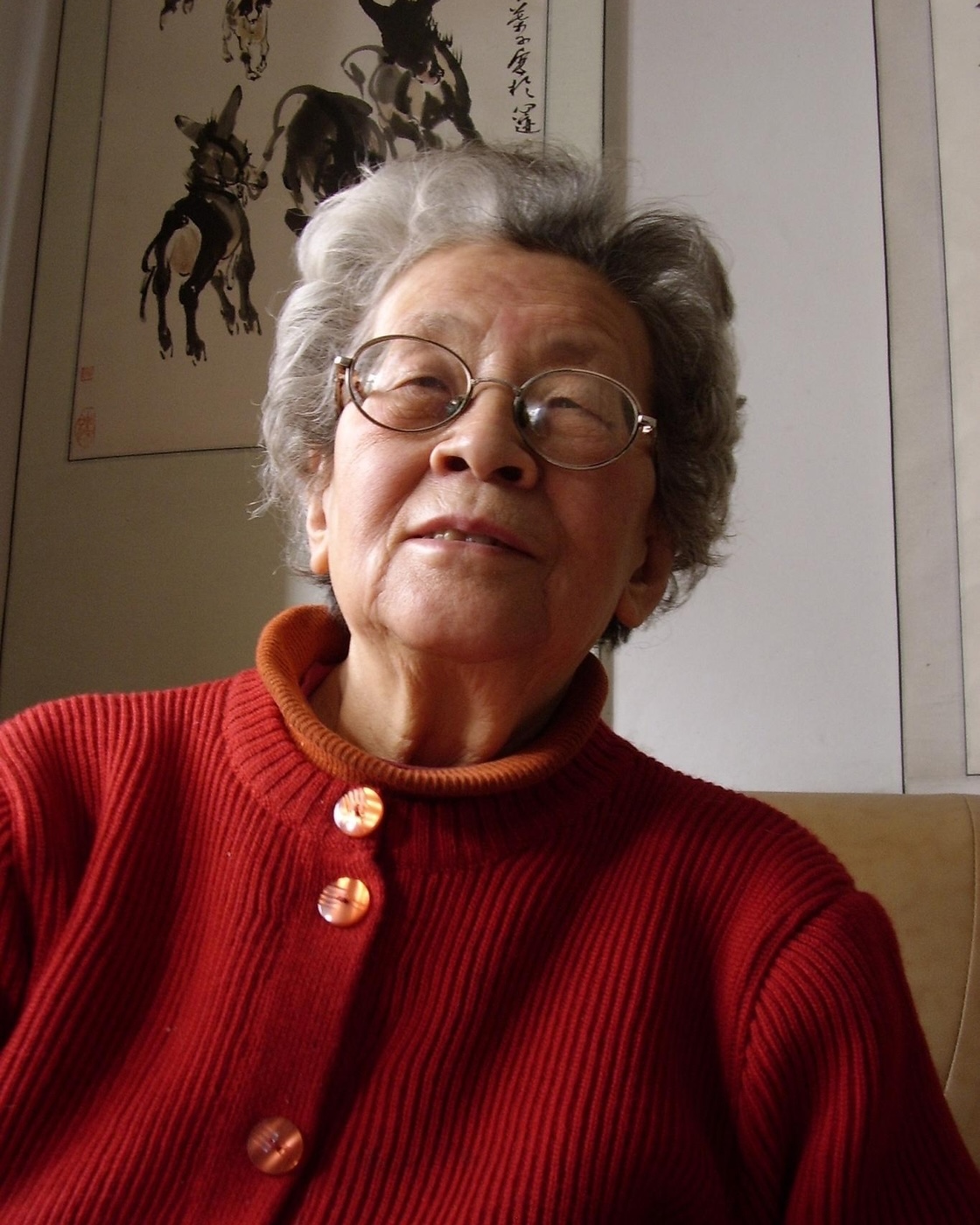
Fengming, A Chinese Memoir
Fengming, A Chinese Memoir is director Wang Bing's second feature-length documentary. The film primarily recounts the long and tragic experiences of an individual in China from the late 1940s to the 1990s, as narrated by the protagonist, He Fengming.
In 1949, with the founding of the People’s Republic of China, 17-year-old He Fengming enthusiastically dedicated herself to the socialist construction of the new nation. She and her husband worked as journalists at a provincial newspaper. In 1957, the Chinese Communist Party launched the Anti-Rightist Campaign. After her husband published three articles in the provincial newspaper, he was labeled a "rightist." She, too, was implicated by her husband and also branded a rightist. During several months of denunciation and struggle sessions, she endured such torment from others that she attempted suicide multiple times, but failed. One evening, returning home, her husband held her, and for the first time, his tears fell on her shoulder.
In April 1958, He Fengming and her husband were forcibly sent to two different labor reform farms in western China to undergo thought reform through labor. During her two and a half years at the farm, she experienced grueling physical labor, hunger, death, and psychological devastation. In 1960, she received a letter from her father informing her that her husband's life was in danger. She tried everything to find some food and, braving heavy snow, rushed to the farm where her husband was working. However, her husband had already starved to death.
For the next 20 years, He Fengming lived precariously, labeled as a rightist and raising her two young children, until her rehabilitation in 1979. In 1991, she returned to the labor reform farm where her husband had died, hoping to find his grave, but ultimately she did not succeed. In her later years, undeterred by external pressures, He Fengming used her pen and tears to document her painful life.
In 2007, the film won the Grand Prize in the International Competition section at the Yamagata International Documentary Film Festival in Yamagata City, Japan.

On Freedom of Speech
“On Freedom of Speech” is a treatise by Hu Ping. It was first published in 1979. A revised version was published in 1980, when Hu ran for local elections at Peking University. The treatise was later published in Hong Kong in 1981 and again in a Chinese journal in 1986. Multiple publishing houses in China made plans to distribute the treatise in book form, but China’s anti-liberalization campaign prevented the books from publishing.
“On Freedom of Speech” explains the significance of freedom of speech, refutes misunderstandings and misinterpretations of freedom of speech, and proposes ways to achieve freedom of speech in China.
This document, provided by the author, also includes the content of the symposium held after the publication of “On Freedom of Speech” in 1986, as well as the preface written by the author in 2009 for the Japanese translation of this treatise.
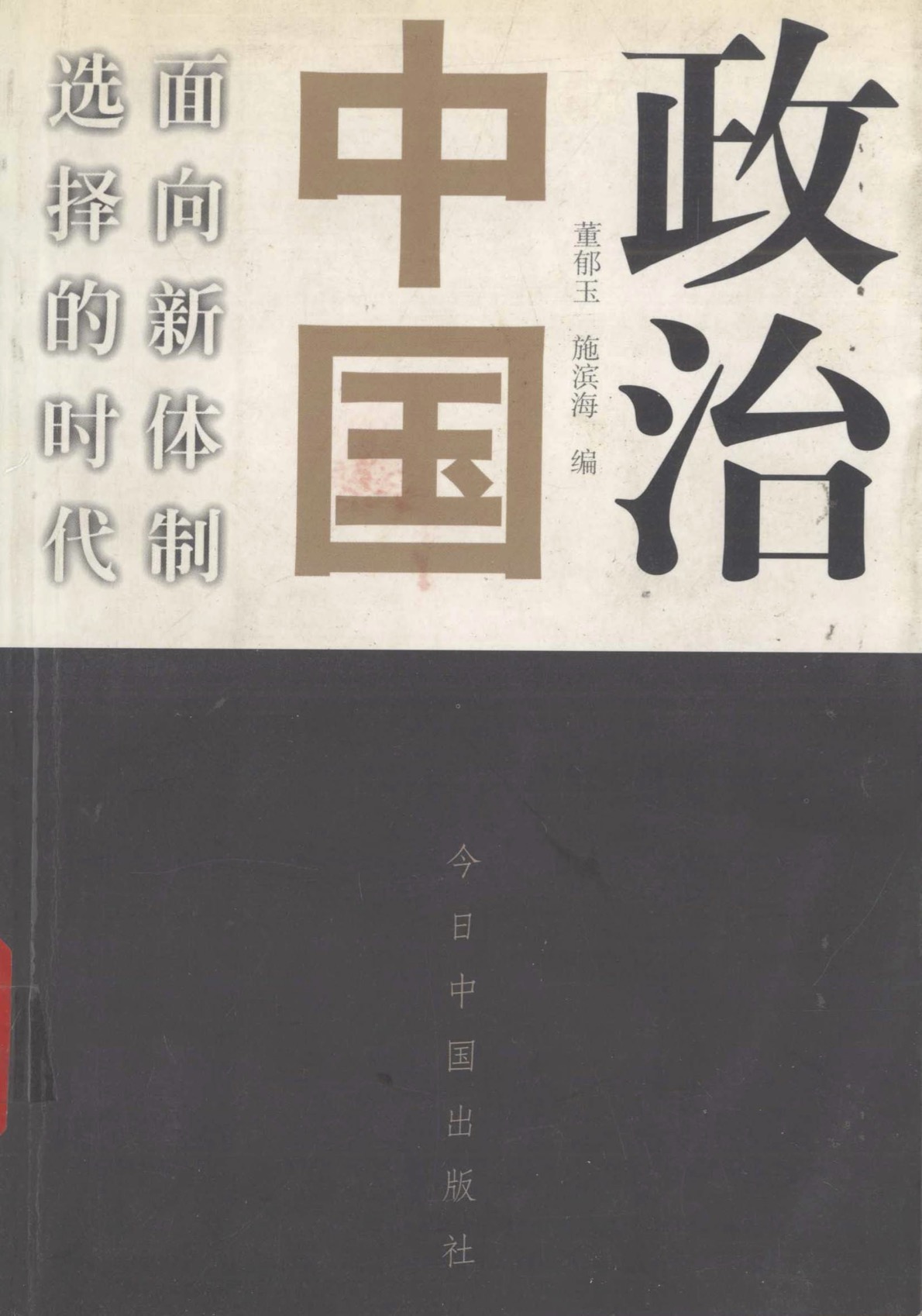
Political China: Towards an Era of Choices for a New System
This book is a collection of writings from the late 1990s regarding political system reform in China. The editors state in the afterword: “This book has collected nearly all, if not all, of the articles discussing political system reform in recent years. From this, we can see the research achievements and level of people’s understanding of political system reform in recent years.”
The articles in the book cover a wide range of topics, from political system reform to democracy, the rule of law, constitutional government, freedom, rights, and economics. Although the articles in the book were all published independently before, Political China was soon banned by the authorities after its publication, and the Today China Publishing House soon shut down under official pressure.
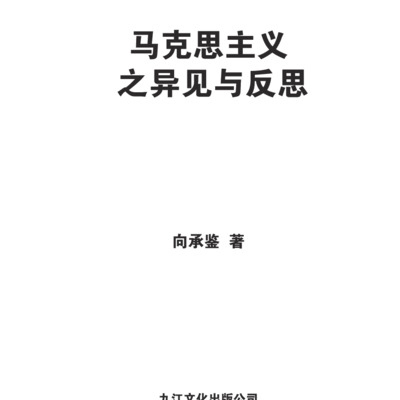
Dissent and Reflections on Marxism
The author of this book, Xiang Chengjian, is a survivor of the "Sparks" case. (For more details on the author, please follow the creator's hyperlink below.) This book is Xiang's critique and reflection on the theories and major works of Marxism.
(The following PDF attachment comes in three parts.)

Fifty Years of the Chinese Communist Party
The author Wang Ming was an early member of the Communist Party of China (CCP) and the first of the "28 and a half Bolsheviks," who lost power after the Yan'an Rectification and were gradually marginalized by Mao. After the Yan'an Rectification, the Internationalists, led by him, lost power in the party. He was gradually ostracized by Mao Zedong, who expatriated him to the Soviet Union in 1956. In his book, Wang Ming recounts his decades-long feud with Mao. It provides a fascinating insight into the early history of the CCP.

Ram
The documentary "Ram" was filmed by independent director Tiger Temple in 2016 and is available here in a revised version by the author in 2021. The film documents a real-life incident that took place in Xi'an during the "1983 crackdown". The encounter of the artist Gong Yang (real name Li Xiaoming), the main character of the documentary, is quite representative. It reflects the cruelty and absurdity of the "1983 Crackdown" political campaign launched under the direction of Deng Xiaoping.

Examination of the Great Famine of the 1960s in Gansu Province
This book is a series of studies on the socio-economic situation in Gansu Province during the Great Famine of 1958 to 1961. The book is, divided into two parts.
The first part consists of five research articles, which document the miserable situation of the people of Gansu during the Great Famine. According to the book, the Gansu Provincial Party Committee admitted in a report that there were incidents of cannibalism in the area during the Great Famine. The articles also expose a series of activities by local authorities during the Great Leap Forward Campaign, such as the irrational construction of mega hydraulic projects, the false reporting of grain output, the operation of communal canteens that caused huge waste, and misleading the hungry people to eat bark and mud. The articles also analyze the reasons behind the disaster.
The second part of the book contains important historical documents reflecting the situation at that time, which are the evidence to support the author's research and analysis, including Gansu Provincial Party Committee's directives on the People's Commune, as well as a number of reports on the Committee’s work submitted to the Central Party Committee. In addition, the book contains news, propaganda posters and photographs published in newspapers at the time.
This book is the 20th series of the Lanzhou Literary and Historical Materials (there is a total 23 series) compiled by the Literary and Historical Materials and Study Committee of the Lanzhou Municipal Political Consultative Conference, an advisory body to the CCP (which is actually directly directed and supervised by CCP). This gives the book special value, as it reflects a semi-authoritative voice that supports independent historians' contention that the famine was far deeper and widespread than official historiography admits.
The book was published in 2002, written by Wu Wenjun and edited by Wang Jialuo. Wu Wenjun and Wang Jialuo also worked together on the 22nd series of the Lanzhou Literary and Historical Materials *Examination of the Great Famine of the 1960s in China* (which is also held by the archive). All but the 20th and 22nd series are available on the website of the Lanzhou Municipal Political Consultative Conference (https://www.gslzzx.gov.cn/col/col11760/index.html) .






